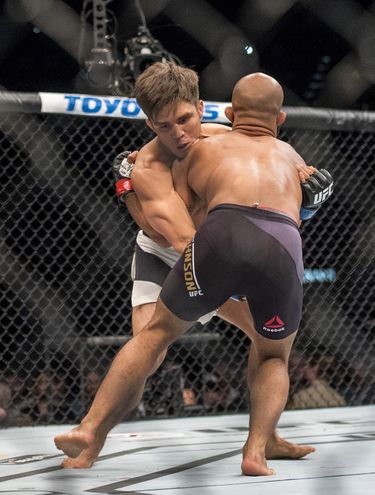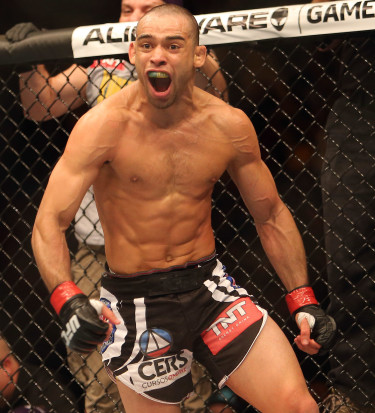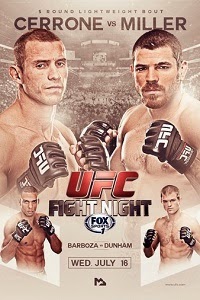In Part one we focused on the backstory that led Sergio Pettis to this matchup on UFC 211. We discussed his strengths, his weaknesses, and the approach he should take if he wants to be victorious on Saturday night. Today we take a closer look at the 2008 Olympic gold medalist, examining his recent mixed martial arts history, his strengths, his weaknesses and his best route to victory in his attempt to once again become a title challenger.
Henry Cejudo’s time in mixed martial arts has been a mixed bag. Although he spent a large part of it undefeated in two organizations — all the while showing world class athleticism, a great ability to pick up on the finer points of the sport, and world class wrestling — what he didn’t always show was depth of skill, variety of skill, or professionalism (most of his career was marred by missed weight cuts). Nonetheless, Cejudo was seen as a future superstar in large part due to his Olympic pedigree, world class wrestling, world class athleticism, and a (presumed) potential to reach a particular demographic. And from March 2, 2013 to April 23, 2016, Cejudo was unbeaten and hadn’t really been tested on the way to a title challenge against Demetrious “Mighty Mouse” Johnson in the co-main event of UFC 197.

That night Cejudo’s undefeated streak and hype train simultaneously derailed, as the Olympic gold medalist was systematically dismantled. His athleticism, physicality, and wrestling had been tabbed as being capable of presenting a stern challenge for Johnson, if not providing Cejudo a clear route to victory. That proved not to be true, outside of a brief moment of success in the clinch, where Cejudo controlled, then took “Mighty Mouse” down in dynamic fashion. Cejudo was outmaneuvered, outworked, outstruck, and embarrassingly outclassed in the area he was supposed to dominate (the clinch).
The thorough undressing of Cejudo forced an adjustment, both in point of emphasis and in versatility; all the way up to his title shot, he had essentially been a wrestler/boxer, which, when matched with his natural talent, was more than enough. On that night he found out that when the gap in physical talent wasn’t canyon-like across the board, the lack of a balanced, disciplined, and versatile game was a recipe for disaster against the best fighters/athletes in mixed martial arts. Changes needed to be made in regards to tactics and techniques. Eight months later, at The Ultimate Fighter: Tournament of Champions Finale, Cejudo was once again in the co-main event, this time against the 2nd best flyweight in the world, Joseph Benavidez. Once again Cejudo came up short, albeit amid much controversy regarding the judging of this extremely competitive fight. But the real story wasn’t so much the result, but the huge leaps forward made by Cejudo — he showed an aggression, maturity, awareness, activity and technique that had previously been unseen. And even in spite of a loss, the improvements made and the technical efficiency shown against Benavidez forced people to reevaluate previous thoughts on Cejudo and raise the seemingly firm ceiling on his potential as a fighter.

Cejudo is an elite wrestler, but the majority of his pedigree is defined by and communicated through his prodigious physical talent. He has the complete package in that regard — he generates big power, and has shown impressive hand and foot speed, balance, and physical strength, as well as world class explosiveness. In a division full of high end athletes, Cejudo is truly an apex predator. But his tenure in the Ultimate Fighting Championship hasn’t been a masterclass regarding wrestling; “The Messenger” has sought a different path in the Octagon, downplaying his wrestling chops in favor of strikes, emphasizing his brief (albeit successful) career as an amateur boxer.
Cejudo has a stance and positioning born out of an extensive amount of drilling and sparring individually in boxing, something that is still pretty rare among the majority of MMA fighters. Cejudo’s striking has been historically punctuated by his extremely sound punching combinations, as well as a distance-gauging left hand that allows him to determine the range he needs to cover to land leads or counters on an opponent trying to play a long range striking game. Similarly to Ronda Rousey, a fair amount of his striking had been attribute based, meaning that while he had education in his striking, a large part of his consistent success with it was the fact that he outclassed the majority of his opponents. Another similarity Cejudo has with the former women’s bantamweight champion and pound-for-pound entrant is that Cejudo’s wheelhouse is the clinch. This is due in part to his outstanding athleticism, but also because of the versatility he has shown there — he has used it to control opponents against the fence, to force extended grappling exchanges to diminish explosiveness and cardio, to set up a variety of takedowns, and to set up attacks with knees and punches to break opponents down. This versatility in the clinch has also allowed him to attack with impunity when throwing combinations or leaping in with straight shots or lead hooks, as that would create clinch opportunities whether he lands or overshoots.

Defensively, Cejudo’s clinch game allows him to manage opponents whose volume and pressure are too much for his footwork and athleticism to keep him away from. Recent improvements in his overall game have allowed him to make use of a more judicious and controlled use of the clinch, as he has embraced the full spectrum of strikes, incorporating kicks and kick-punch combinations that allow him to effectively defend, counter, and attack different ranges without having to resort to huge explosive movements to cover distances. Now Cejudo can carefully navigate these distances, increasing the efficiency of his energy usage and the accuracy of his shots.
Cejudo still remains one of the best wrestlers in MMA, with an outstanding array of takedowns, including but not limited to trips, singles, doubles, and so on; if Cejudo wants to get in on you and get you down, he will get in on you and get you down. He is that good, but as good as he is at those two things, one thing he hasn’t been outstanding at is control, nor has he developed anything resembling a legitimate submission game. Defensively he has been bulletproof, and it’s hard to think of a fighter or situation that will arise that will expose it as anything less than that.

The issue of control is a big one in this fight. Pettis is going to want to control the pace and place of the fight; he understands the huge disadvantage he is at in regards to durability, strength, speed, and explosiveness. He is going to want to use feints, varying attacks, movements, and angles to limit Cejudo’s ability to explode in spots that can turn or end a fight. The slower the fight, the more Cejudo’s lack of seasoning will appear, both on the feet and in the overall game; gifted or not, experience counts, and the gap in experience between the two is immense. In the two fights Cejudo has lost, his opponents were able to wrest control from him, limiting and managing his bursts of offense and athleticism. Pettis will look to follow suit. It’s up to Cejudo to be devastatingly effective, maximizing each and every opportunity he has to flash those physical advantages and force exchanges — both in the wrestling and the striking — that allow his athleticism to be the determining factor in the fight, because that is the one clear advantage he has.
Similarly to the Rose Namajunas vs. Michelle Waterson fight, where the skill and experience gap was fairly wide, what determined the fight was the physicality. Waterson couldn’t slow, back up, or hurt Namajunas, who was consistently able to do all of those things; in all engagements, in all ranges, she used intelligent aggression, size, technique, and physicality to navigate any technical or strategic advantages Waterson may have had. It would be in Cejudo’s best interest to do the same.
Saturday night gives us a chance to see how much further along Henry Cejudo has grown in regards to his technical and tactical development. After two losses — one being decisive, the other disputed — where does Cejudo fit, and is he really the third best flyweight in the division, or was the fight with Benavidez a one off, one which will be followed by a regression mentally, technically, and strategically? At UFC 211 we find out whether “The Messenger” can prove himself worthy of his ranking and all the presumptions of future success. Or we could find out that the Johnson fight wasn’t an outlier, and Cejudo, while talented, isn’t the fighter we thought he was or could be. On Saturday night, it gets real.

UFC 211: Miocic vs. Dos Santos 2 takes place May 13, 2017 at American Airlines Center in Dallas, Texas.
Click the stars to rate how good you think UFC 211 will be.
**********




